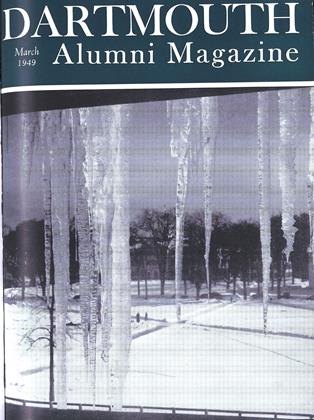WITH the aid of several graduate students, two members of the Dartmouth faculty, Prof. Gordon F. Hull Jr. '33 of the Physics Department and Prof. Millett G. Morgan of Thayer School, are conducting separate research projects on short radio waves for the Office of Naval Research.
Professor Hull's work was begun four years ago in connection with some wartime radar research while he was a member of the Technical Staff at the Bell Telephone Laboratories. In carrying out these studies, he has been primarily concerned with some of the optical properties which microwaves exhibit and their similarity to light waves. During the present academic year a study of arc formation and particularly the transformation of bridges between separate electrodes into arcs is" being carried out by Professor Hull with the assistance of James W. Meyer, while a study of the Faraday effect in the microwave region and measurements of dielectric constants of materials at microwave frequencies are being, continued with the help of Richard G. Barnes, research assistant in physics.
At Thayer School, Professor Morgan is conducting basic research in the causes and possible methods of eliminating fading in the reception of short waves. Assisting him in this work are Richard C. Dunham '39, W. Raymond Evans Jr. '48, Arthur J. Hendler '45, C. Robert Paulson '45 and Franklin L. Torney Jr. '43. Dunham is a technician and the others are graduate students.
Next summer Professor Morgan hopes to conduct field experiments on his farm in Etna.
Dartmouth College's famed scholar, Rufus Choate, used what is perhaps the longest sentence ever spoken in eulogizing Daniel Webster at the College on July 27, 1853. It contained 1,200 words and took about ten minutes to deliver.
 View Full Issue
View Full Issue
More From This Issue
-
 Article
ArticleInternational Communism
March 1949 By SIDNEY HOOK -
 Class Notes
Class Notes1918
March 1949 By ERNEST H. EARLEY, DONALD L. BARR, RICHARD A. HOLTON -
 Class Notes
Class Notes1912
March 1949 By HENRY K. URION, RALPH D. PETTINGELL, EDWARD B. LUITWIELER -
 Class Notes
Class Notes1931
March 1949 By A. W. LAUGHTON, WILLIAM H. SCHULDENFREI, EDWIN F. STUDWELL -
 Class Notes
Class Notes1923
March 1949 By TRUMAN T. METZEL, COLIN C. STEWART III, LEON H. YOUNG JR. -
 Article
Article"The Rewards Are Skill and Enjoyment"
March 1949 By PROF. F. CUDWORTH FLINT
Article
-
 Article
ArticleNEW HAMPSHIRE GOVERNORS
January 1919 -
 Article
ArticleThe Connecticut above Hanover, Cube Mountain in the background
-
 Article
ArticleWith the D.O.C.
March 1951 By BOB BRACE '52 -
 Article
ArticleRugby
May 1956 By CLIFF JORDAN '45 -
 Article
ArticleSoccer
OCTOBER 1966 By DICK BALDWIN -
 Article
ArticleJOURNALISM AS A CAREER
December 1932 By Paul E. Moyer

